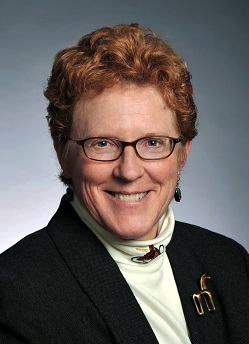Director's Message

It is my pleasure to welcome you to the IDEAS Office. The IDEAS Office was created to support health professions educators in taking a scholarly approach to educational practice and to foster educational scholarship through collaboration. Planned opportunities include faculty development, health professions education (HPE) grand rounds, research funding information, and collaboration with others in the field of health professions education.
The Association of American Medical Colleges (AAMC) Group on Educational Affairs (GEA) report provides a good starting point to discuss the idea of health professions educational scholarship. I was fortunate to be able to participate in this invited conference and hope that I was able to contribute something, in addition to taking much away from the experience.
Below are some direct quotes from the final report that I hope will stimulate thought and begin a discussion about educational scholarship in the health professions.
From the AAMC GEA invited Consensus Conference on Educational Scholarship:
"Educators add value to their institutions by contributing to the educational mission and/or by advancing knowledge in the field of education… Engagement is documented with evidence that educators' work is informed by what is known in the field-a scholarly approach-and how, over time, educators contribute to knowledge in the field-educational scholarship. There is both synergy and tension between faculty's roles as educators and as contributors to the broader medical education field.
An educator must engage with the broader educational community to demonstrate a scholarly approach.
- Scholarly Approach: Faculty take a scholarly approach when they systematically design, implement, assess, and redesign an educational activity, drawing from the literature and "best practices" in the field. Documentation describes how the activity was informed by the literature and/or best practices.
- Engagement with the Education Community: A scholarly approach requires that instructors apply the principles and findings from the education literature (e.g., competency-based education, deliberate practice) to their teaching, along with development of associated instructional materials.
- Educational Scholarship: Faculty engage in educational scholarship by both drawing upon resources and best practices in the field and by contributing resources to it. Documentation begins by demonstrating that an educational activity product is publicly available to the education community in a form that others can build on. The product may be available at the local level-in the department, medical school, or university-or at the regional, national, or international level. Once a product is public and in a form that others build on, peers can assess its value to the community [by] applying accepted criteria."
Carol S. Hodgson, MSc, PhD
Director, IDEAS Office
Associate Professor, Department of Pediatrics
J. Alan Gilbert Chair in Medical Education Research
Email: carol.hodgson@ualberta.ca
Office Phone: 780-492-1515
For general information about the IDEAS Office, email ideasctr@ualberta.ca
The J. Alan Gilbert Chair in Medical Education Research
The J. Alan Gilbert Chair in Medical Education was first established in 1991 to honor one of the Faculty of Medicine & Dentistry's most prominent and early medical educators, Dr. James Alan Longmore Gilbert. In addition to individual donations, the Saudi Arabian government graciously donated the largest amount of the funding for the endowed chair position through the King Faud Fund in order to further the educational mission of the Faculty. The first recruitment to the J. Alan Gilbert Chair in Medical Education Research was in 2010 with the first chair appointed that same year to Dr. Carol Hodgson.
Dr. J. Alan Gilbert
From the Royal College of Physicians of Edinburgh:
"Education was the field in which Dr. Gilbert became a legend, not only in Edmonton but across Canada and around the world as evidenced by the many international students competing to do elective rotations with him as preceptor. He won the Outstanding Teacher Award of the Faculty of Medicine in 1972, 1974, 1979, 1980, 1981 and 1985. He was Director of the Clinical Teaching Unit at the Royal Alexandra Hospital from 1967 till 1984. He was Chair of the Committee for Research in Medical Education at the U. of A. from 1966 to 1974, Chair of the Faculty Curriculum Advisory Committee from 1966 to 1968, an executive member of the International Society for Research in Medical Education and then its President in 1973. He brought many innovations to medical education at the U of A including the first Objective Structured Clinical Examination which became and continues to be a standard tool for evaluating clinical skills. He published widely including papers in the Journal of Medical Education, the British Medical Journal, Medical Teacher, the New England Journal of Medicine and the Canadian Medical Association Journal. In 1976 he was appointed to the Editorial Board of the British publication Journal of Medical Education and in 1980 he was instrumental in the establishment of the journal Medicine North America."
Learn more.